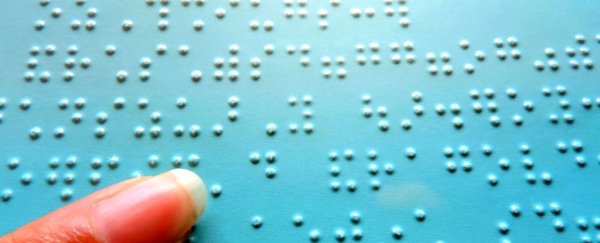Six engineering undergraduate students at the Massachusetts Institute of Technology (MIT) have designed a portable device that converts text to braille in real-time.
Their first prototype was created in a 15-hour hackathon in early 2016. Since that time, the device, called Tactile, has undergone extensive development. Now, it's the size of a candy bar and completely portable.
The students have applied for a patent for the device, although they are already working on its next iteration.
What really sets Tactile apart from other braille translators, though, is its low cost. Most of these devices are expensive, and limited to the translation of text that is available digitally.
For example, the HumanWare Braillant attaches to a computer or mobile device to translate text into braille, and it costs US$2,595. Tactile's creators hope to sell their device for less than US$200.
 Lemelson/MIT
Lemelson/MIT
The students who invented the translation device have plans to improve Tactile, and they've also got the means to do it. They recently won one of the US$10,000 Lemelson-MIT Student Prizes for 2017, which they will spend refining and improving the device.
"Currently, the camera only takes a picture of its field of view," team member Chandani Doshi explained in an email to Smithsonian.
"We are aiming to make the device similar to a handheld scanner that allows the user to scan the entire page in one go."
If they're successful, this would make the device simpler to use and eliminate the reader's need to remember where they are on the page.
Accessibility for people with disabilities is getting more attention now than it has in the past as the movement for inclusion grows. The European Union has drafted rules that will mandate that products and services be more accessible to people with disabilities, including the blind.
The Women's March on Washington even added a virtual branch so people with disabilities could attend that way if they chose to.
There are 1.3 million legally blind people in the US, and the World Health Organisation (WHO) estimates that 285 million people worldwide are visually impaired - 39 million of them are blind, and the remaining 246 million have low vision.
The American Foundation for the Blind estimates that fewer than 10 percent of blind people can understand braille, mostly due to a chronic teacher shortage in this area.
Even so, Tactile, which should be on the market within two years, will make any book in any library accessible to those who do understand braille - and it will also make braille itself far more accessible and easy to learn.
In fact, using Tactile might be the revolution braille needs to bring a higher level of literacy back to the blind community.
This article was originally published by Futurism. Read the original article.
